Once the NBA trade deadline passes, the league’s buyout season unofficially begins. What exactly are buyouts, and how do they work? Today’s Hoops Rumors glossary entry will answer those questions. Let’s dive in…
Rather than waiving a player outright, a team will negotiate the terms of the player’s release. Then, once the player clears waivers, his guaranteed salary with his previous team will be reduced or eliminated altogether.
The most common form of buyout involves a veteran player on a non-contending team being granted his release during the final year of his contract to join a playoff club down the stretch.
It typically happens after the trade deadline because by that point there’s no other way for a player to change teams. It’s even more frequent if the player was traded at the deadline for salary-matching purposes to a team that doesn’t view him as part of its plans.
Lowry and Wright each fit this bill. The Hornets and Wizards aren’t going to make the playoffs this season and are more focused on developing their young players. Buyouts for those two veterans gave them a chance to join teams with grander short-term aspirations in Philadelphia and Miami, respectively.
For Theis, the motivating factor for pursuing a buyout was playing time — he was buried on the depth chart with the Pacers, prompting him to agree to a buyout and join another playoff team with whom he’d have a larger role.
For the player, the motivating factor is generally the desire to play for a winning team rather than a chance to earn the most money possible. Many players who are bought out give up roughly the amount of money they’ll make on new prorated minimum-salary contracts, meaning they don’t necessarily come out ahead financially — they just get a chance to play in the postseason before returning to free agency in the summer.
As for the team, there’s little downside to letting a veteran go, since the player is usually in the final year of his contract and the club completing the buyout is rarely in contention for a playoff spot. Buying out that veteran can save the team some money, earn some goodwill with a player and an agent, and open up a roster spot and/or minutes for a younger player to take over.
What happens if a team and player reach a buyout agreement, then the player is claimed off waivers?
Waiver claims are rare in the NBA, particularly for players earning more than the minimum salary. If a team doesn’t have the cap room available to fit a waived player’s salary, that team needs a trade exception or disabled player exception big enough to accommodate that player’s salary. Otherwise, it can’t place a claim.
Those rules will make it impossible for NBA teams to claim a player like Lowry, who had a cap hit of $29,682,540 before being waived. No club has enough cap room or a cap exception big enough to place a claim on the guard.
When a player agrees to give up some of his salary as part of a buyout, that amount isn’t removed from his cap charge until after he clears waivers, so any team wanting to claim Lowry would need to be able to accommodate his original $29.7MM salary (not that adjusting that number slightly downward would have changed the equation for any teams anyway, given that the biggest trade exception around the league is worth $23MM).
The rarity of NBA waiver claims is the reason why a player who receives a buyout often reaches an agreement with a new team even before he has cleared waivers. The odds of a waiver claim are so low that it usually doesn’t make sense for a player to wait until he’s officially a free agent to start negotiating.
The team completing the buyout almost always gives the player’s agent the go-ahead to open those talks with potential suitors. It’s a win-win, since a player who knows he has a landing spot lined up is more likely to give back a little extra money to his old team. Lowry reportedly reached a deal with the Sixers before being officially waived by the Hornets, while Wright did the same with the Heat before being cut by Washington.
In the very unlikely event that a bought-out player is claimed on waivers, the buyout agreement between him and his previous team is no longer necessary — since his new team is taking on his original contract, his old team will no longer owe him a single cent or carry his old cap hit. That’s essentially the most efficient possible form of buyout for the player’s old team.
How do the cap hits work when a team and player agree to a buyout?
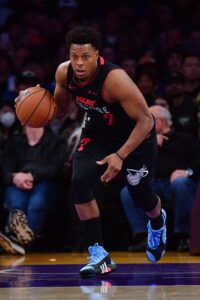 The equation for a player in the final year of his contract is pretty simple — the amount he agrees to give up in the buyout is simply subtracted from his overall cap hit. Lowry agreed to surrender to $1,138,964, reducing his cap charge for the Hornets from $29,682,540 to $28,543,576.
The equation for a player in the final year of his contract is pretty simple — the amount he agrees to give up in the buyout is simply subtracted from his overall cap hit. Lowry agreed to surrender to $1,138,964, reducing his cap charge for the Hornets from $29,682,540 to $28,543,576.
For a player who isn’t in the final year of his contract, the calculations are a little more complicated, and depend on when exactly the buyout is completed.
For instance, Kemba Walker agreed to a buyout with the Thunder during the summer of 2021. At the time, he had $73,669,500 in guaranteed money left on his contract – $36,016,200 for 2021/22 and a player option of $37,653,300 for 2022/23.
Walker agreed to give up exactly $20MM, which worked out to about 27.1% of his overall guarantee. That meant reducing each season’s cap hit by 27.1%, which left Oklahoma City with charges of $26,238,422 for ’21/22 and $27,431,078 for ’22/23.
That 27.1% reduction was applied evenly across two seasons in Walker’s case because he hadn’t been paid any of his salary for the coming season. In cases where a player is bought out later in the league year, the formula is weighted less heavily toward the current league year.
For example, Rubio agreed to his buyout with the Cavaliers on January 4 of this season. At the time, he had a cap hit of $6,146,342 for 2023/24 and a $4,250,000 partial guarantee for ’24/25 (his full cap hit for next season would have been $6,439,025).
Rubio gave up $5.4MM as part of his buyout, leaving Cleveland with cap charges worth $3,722,327 this season and $1,274,015 next season. Despite his ’23/24 salary being larger than his ’24/25 guarantee, a higher percentage of Rubio’s buyout money was applied to year two, since year one was nearly halfway over.
Is there a deadline for buyouts to get done?
There’s technically no deadline, but March 1 is the date to watch. Players bought out and/or waived after that date aren’t eligible to play in the postseason for a new team.
That March 1 cut-off can cause some confusion — a player doesn’t necessarily have to be signed to his new team by then in order to be playoff-eligible. He just has to be released by then.
For instance, a player who is waived by one team on February 25 and then signs with a different team on April 7 would be postseason-eligible for his new club. A player who is waived on March 4 and signs on April 7 would not be.
A player who has been out of the NBA all season would be playoff-eligible if he were to sign with a team in March or April.
Are there restrictions for where a player who receives a buyout can sign?
If a player agrees to reduce his guaranteed salary as part of his release, he can’t re-sign with the team that waived him for a full year, or until his contract would have ended, whichever is later.
A player who is bought out or waived after being traded can’t re-sign with the team that traded him away until the one-year anniversary of the deal, or until the July 1 after his contract ends, whichever comes first. There’s one exception to this rule — if a player is traded multiple times during the same league year and then is bought out or waived, he’s only prohibited from return to the team that traded him last.
For example, since the Pelicans traded Kira Lewis to the Pacers, who flipped him to the Raptors, who sent him to the Jazz, New Orleans and Indiana would be able to sign the guard if he’s waived by Utah this season, but Toronto wouldn’t be permitted to do so.
Finally, there’s a new restriction facing certain players who clear waivers under the league’s new Collective Bargaining Agreement. If the player’s pre-waiver salary was greater than the non-taxpayer mid-level exception ($12,405,000 in 2023/24), that player is prohibited from signing with a team whose salary is above either tax apron.
Lowry and Spencer Dinwiddie are among the players who met this criteria and were ineligible to sign with seven specific clubs (the Celtics, Nuggets, Warriors, Clippers, Heat, Bucks, and Suns) this season. We dug into this new rule in more detail in a separate article.
Note: This is a Hoops Rumors Glossary entry. Our glossary posts will explain specific rules relating to trades, free agency, or other aspects of the NBA’s Collective Bargaining Agreement. Information from Larry Coon’s Salary Cap FAQ and ESPN’s Bobby Marks was used in the creation of this post.
Earlier version of this post were published in 2018, 2020, and 2022.
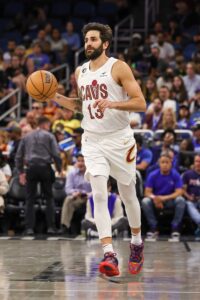 Although the term “buyout” is often applied colloquially when any veteran is released after the trade deadline, it applies specifically to a player who gives up a portion of his salary to accommodate his release.
Although the term “buyout” is often applied colloquially when any veteran is released after the trade deadline, it applies specifically to a player who gives up a portion of his salary to accommodate his release. The equation for a player in the final year of his contract is pretty simple — the amount he agrees to give up in the buyout is simply subtracted from his overall cap hit. Lowry agreed to surrender to $1,138,964, reducing his cap charge for the Hornets from $29,682,540 to $28,543,576.
The equation for a player in the final year of his contract is pretty simple — the amount he agrees to give up in the buyout is simply subtracted from his overall cap hit. Lowry agreed to surrender to $1,138,964, reducing his cap charge for the Hornets from $29,682,540 to $28,543,576.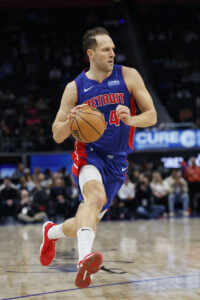 The Knicks pick up a pair of solid rotation players (
The Knicks pick up a pair of solid rotation players (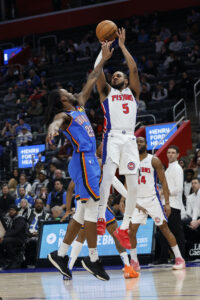
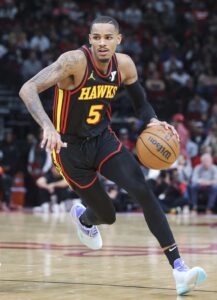
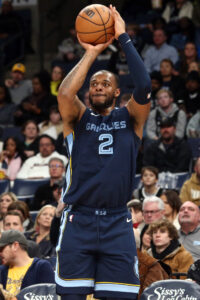 What does that mean in practical terms? Let’s use Grizzlies big man
What does that mean in practical terms? Let’s use Grizzlies big man